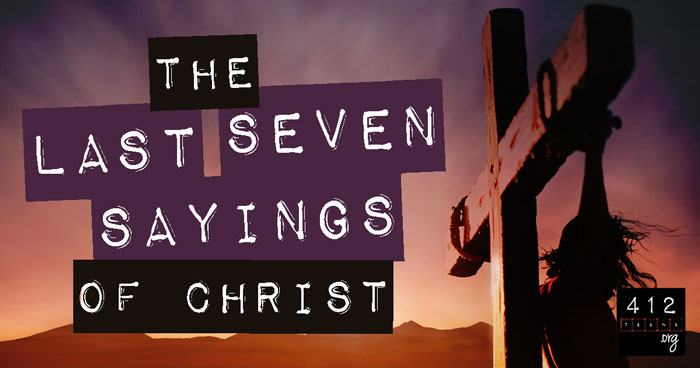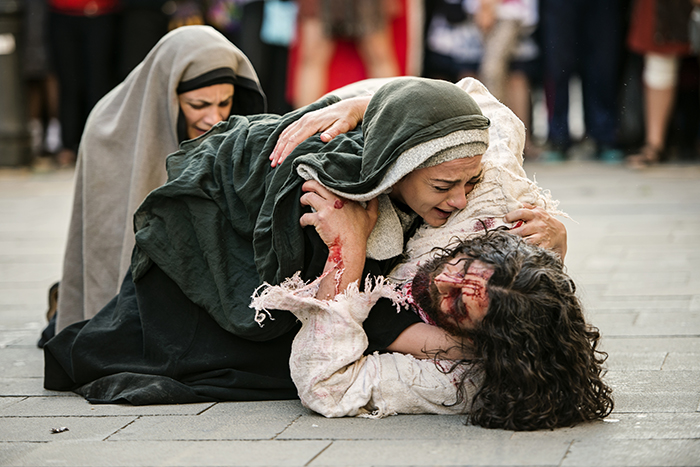What are the last seven sayings of Christ and what do they mean?

The last words that someone says often have the most impact or are highly valued—whether that person is moving, going away to war, on their death bed, or some other significant moment of departure. When Jesus was on the cross, He uttered seven phrases which are recorded in Matthew, Luke, and John. Often these "Seven Last Sayings of Christ" are examined at Easter to provide a time of reflection on Jesus’ death and resurrection. Let’s take a moment to investigate them and their meaning (in no particular order).
1. "Father, forgive them, for they do not know what they are doing." (Luke 23:34)
Many were involved in the crucifixion and mocking of Jesus—the Pharisees, Pilate, Herod, the Roman soldiers, the criminals crucified alongside Him, and those who stood watching and sneering at Him. The people who crucified Jesus were not aware that what they were doing was part of God’s plan of salvation. Although Jesus was innocent and the onlookers and participants in His torture were guilty, Christ’s prayer to forgive them, in the midst of His persecution, proves His unlimited compassion and divine grace. His prayer also fulfilled the prophecy in Isaiah 53:12, which said the Savior would "[intercede] for the transgressors."
These people weren't automatically forgiven with His words, but it shows that Jesus was willing to forgive them if they would turn to Him. Jesus' prayer communicates the merciful heart of God and gives us an example of godly forgiveness while suffering persecution—just as He taught in Matthew 5:43-44.
2. "I tell you the truth, today you will be with me in paradise." (Luke 23:43)
In this passage, Jesus is talking to one of the criminals that was crucified alongside Him. One of them hurled insults at Him, but the other defended Jesus. The man admitted that the two of them were guilty of their crimes and deserving punishment but that Jesus was innocent. This criminal asked Jesus to remember him in His kingdom, and Jesus replied by saying that he would be with Him in paradise upon his death.
3. To Mary: "Dear woman, here is your son!" To John: "Here is your mother!" (John 19:26-27)

Even while Jesus was suffering on the cross, He was thinking of Mary and who would care for her after He was gone. As the eldest son, Jesus had a cultural obligation to take care of His mother, who was most certainly a widow by that time. Scripture has always been clear about the importance of caring for widows and the elderly. The responsibility of caring for His mother was given to His dear disciple John, who soon took her into his own home (John 19:26-27).
4. "I am thirsty." (John 19:28)
When Jesus said this, the Roman guard present gave Him vinegar to drink, which was customary at a crucifixion. This statement fulfilled prophecies about the coming Messiah in Psalm 22:15 and Psalm 69:21, which speak of His thirst in the midst of intense suffering.
5. "My God, my God, why have you forsaken me?" (Matthew 27:46)
Matthew only records one statement by Jesus on the cross, when Jesus cries in a loud voice, "Eloi, Eloi, lama sabachthani?" which means "My God, my God, why have you forsaken me?" These words fulfilled a prophecy specifically describing the death of the Savior in Psalm 22.
Jesus, who had been with the Father eternally, who had never sinned, now had the sins of all humanity placed upon Him (2 Corinthians 5:21). His words echo the anguish of abandonment and separation from God in Psalm 22:1. The penalty for sin is death (Romans 6:23), and death means separation. The Father allowed His Son to bear the weight of every sin, from the beginning to the end of time, and serve as a final sacrifice for all of humanity, as He had promised long, long ago (Isaiah 53:1-12).
Jesus knew this would happen and had already accepted it, for this was the fulfillment of God's promise to all the world (John 3:16-17; John 10:18).
6. "Father, into Your hands I commit my spirit." (Luke 23:46)
In this moment, Jesus willingly gave up His spirit to His Father, quoting Psalm 31:5. He was about to experience physical death, and God had accepted His sacrifice for sin, redeeming all those who believed in the Savior for the rest of time (John 1:12-13).
7. "It is finished!" (John 19:30)
The final statement Jesus made from the cross in His earthly body declares that the work that He had been sent to do was complete! The Greek word for "finished" is tetelestai which is an accounting term that means "paid in full." When Jesus said that "it is finished," He was announcing that the debt of sin had been paid in full by the perfect Son of God (Isaiah 53; John 1:29; Hebrews 9:12).
These are the seven final statements that Jesus uttered on the cross. They give us insights into Jesus' divine character and His state of mind as He suffered during the crucifixion. Because Jesus took on the punishment you owed for your sins against God, your sins can be 100% forgiven. When you accept Jesus as your Savior from that punishment, you can experience a wonderful friendship with God and have eternal life with Him! If you haven’t chosen to believe in Jesus' sacrifice on your behalf, you can choose to believe right now. If you still want to research more before you make a decision, please take a look at the articles listed below.
ALSO SEE:
- How can I be saved?
- Are all my past, present, and future sins forgiven?
- What does it mean that Jesus is the way, the truth, and the life?
- Is Jesus the only way to Heaven?
- Did Jesus really die?
- Did Jesus really come back to life?
- Does the Old Testament predict the coming of Jesus?
- How can Jesus relate to me if He was sinless?
- What is Good Friday / Holy Friday?


TL;DR
The Bible records that Jesus uttered seven statements on the cross before He died: "Father, forgive them, for they do not know what they are doing"; "I tell you the truth, today you will be with me in paradise"; "Dear woman, here is your son!" to His mother along with "Here is your mother!" to the disciple John; "I am thirsty"; "My God, my God, why have you forsaken me?"; "Father, into Your hands I commit my spirit"; and "It is finished!" Many of these were spoken to fulfill Old Testament prophecies concerning the way the Messiah would die to accomplish humanity's salvation from the punishment of sin and demonstrate the character and heart of Jesus as He paid our sin debt. Anyone who believes in Jesus' sacrifice for their sin will have eternal life (John 8:12; Romans 10:9).

Writer: Hanna S.
Hanna loves spending time with kids and teens. She enjoys being detectives with them to investigate God's Word to discover truths to answer any questions. She is the co-author of a newly published apologetics curriculum for children and teaches one online for highschoolers-adults. To learn more about her ministry you can visit networkerstec.com. For fun, she likes to play Ultimate Frisbee, read historical fiction, and paint.
